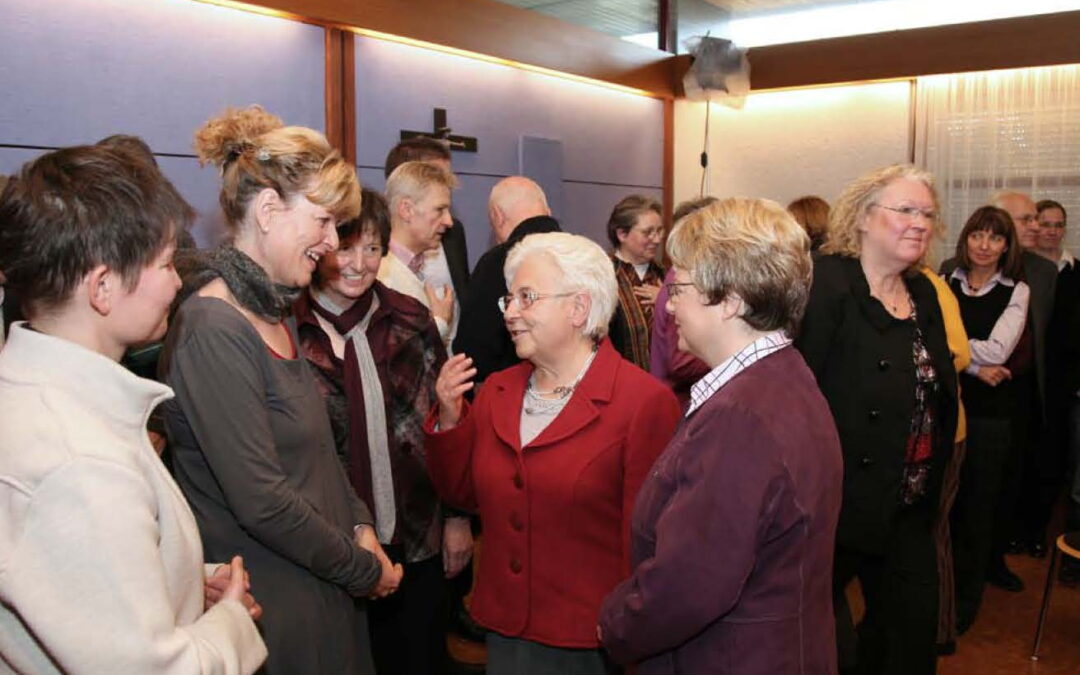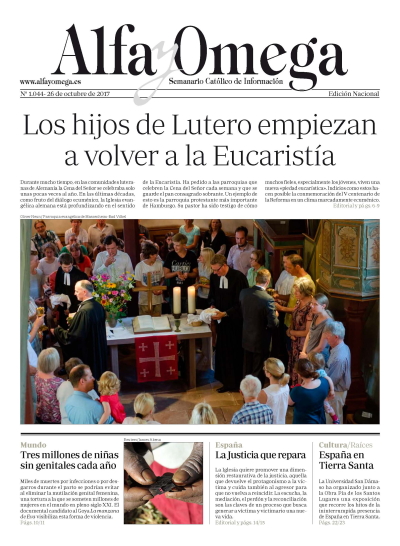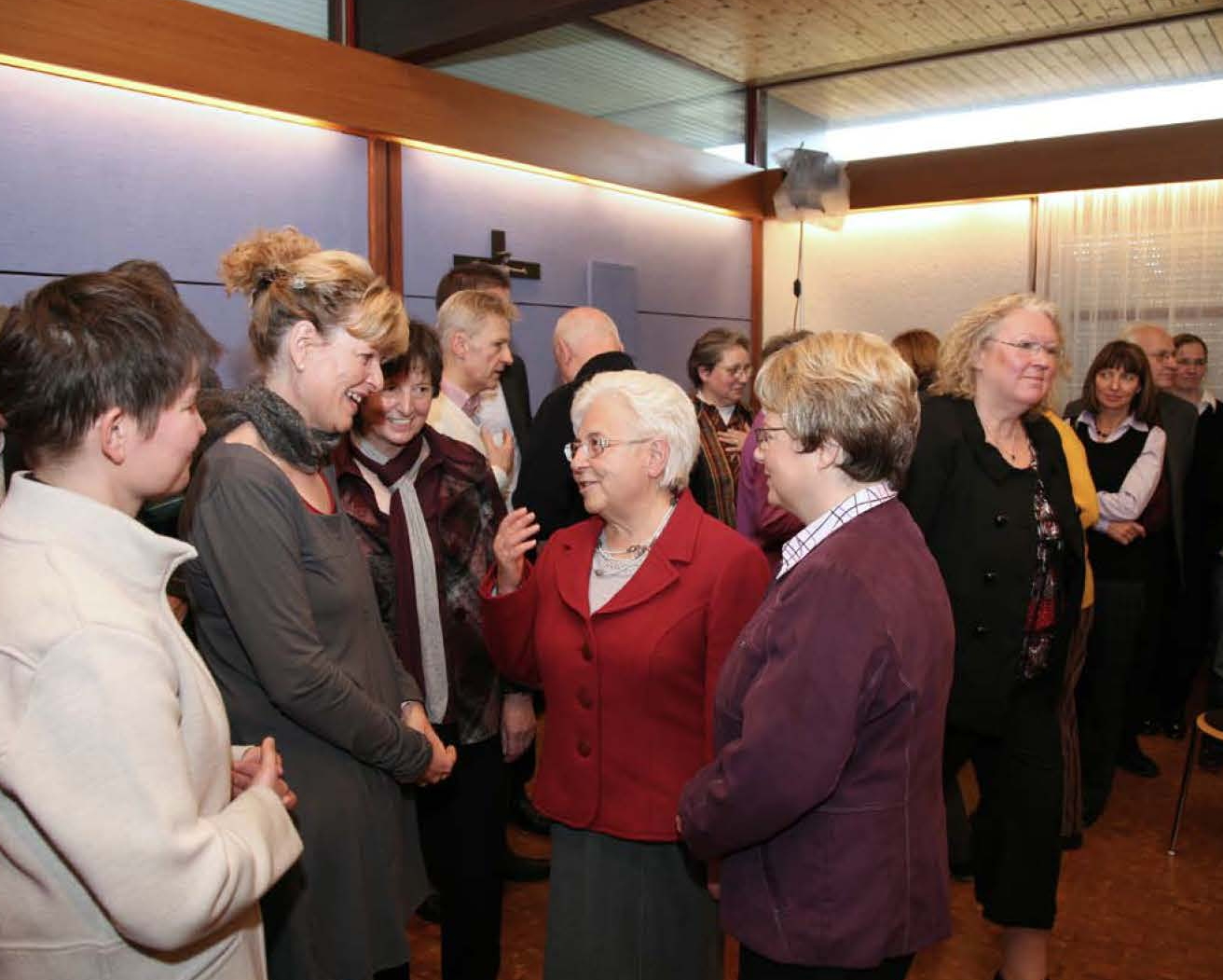
Maria Voce: “To dialogue means taking risks.”
 The keyword is “journey”, because “truth is sought through journeying”. Maria Voce, or Emmaus as she is known in the Focolare, became animated as she described Pope Bergoglio’s vision of ecumenism. Her eyes lit up when speaking about an ecclesial reality which truly has unity as its vocation. Such was the route undertaken by Focolare founder Chiara Lubich. It is one of the very few movements born in the Catholic Church which embraces the faithful of other churches. It is indeed a rarity in times of fragmentation. “I think that true Catholicism is what God perceives it to be: a gathering of communities each having their own identity. I imagine the moment will come, because it must come, when everyone will be one. Jesus asked for this. Therefore not just one Catholic Church: it could be Catholic in the sense of universal, but not a single Roman Church or a single Church of Constantinople.” Your words came across almost as a provocation. “Of course, they’re provocative!” Maria Voce replied. It was clear that in her “provocation” she felt supported by the Argentinean Pope. On 3 June, the last Sunday of Pentecost, the Pontiff convened the charismatic Catholic and non-Catholic movements. Before the meeting had even started, the Pope specifically asked for Maria Voce. A priest went looking for her and she joined the group of leaders sitting on the stage. At the end of his speech, the Pope approached her and, to her great surprise, took her by the hand: “Come, Maria …,” he said without adding anything else. And they left the assembly together. “From the first moment of his election, when he appeared on the balcony to greet the crowds and introduced himself as a Bishop and not as a Pontiff, I understood that it was already a sign of his ability to relate to other churches.” “Jorge Mario Bergoglio,” Maria Voce recalls, “had a living experience of ecumenism with other churches in Buenos Aires. Considering that time, Maria Voce identified the seed of what happened as a consequence during his pontificate, which reached its utmost expression with the Pope’s presence, almost a year ago, in commemorative celebrations held in Lund (Sweden) which marked the 5th centenary of the Protestant Reformation of Martin Luther. “Something immense happened in Lund, when two Church leaders at the same level of authority met and signed a joint statement.” The challenge is to follow the Pope’s example and join in the ‘spirit of Lund’. “If John Paul II will always be remembered for the ‘spirit of Assisi’, the present Pope should be remembered for the ‘spirit of Lund’.”
The keyword is “journey”, because “truth is sought through journeying”. Maria Voce, or Emmaus as she is known in the Focolare, became animated as she described Pope Bergoglio’s vision of ecumenism. Her eyes lit up when speaking about an ecclesial reality which truly has unity as its vocation. Such was the route undertaken by Focolare founder Chiara Lubich. It is one of the very few movements born in the Catholic Church which embraces the faithful of other churches. It is indeed a rarity in times of fragmentation. “I think that true Catholicism is what God perceives it to be: a gathering of communities each having their own identity. I imagine the moment will come, because it must come, when everyone will be one. Jesus asked for this. Therefore not just one Catholic Church: it could be Catholic in the sense of universal, but not a single Roman Church or a single Church of Constantinople.” Your words came across almost as a provocation. “Of course, they’re provocative!” Maria Voce replied. It was clear that in her “provocation” she felt supported by the Argentinean Pope. On 3 June, the last Sunday of Pentecost, the Pontiff convened the charismatic Catholic and non-Catholic movements. Before the meeting had even started, the Pope specifically asked for Maria Voce. A priest went looking for her and she joined the group of leaders sitting on the stage. At the end of his speech, the Pope approached her and, to her great surprise, took her by the hand: “Come, Maria …,” he said without adding anything else. And they left the assembly together. “From the first moment of his election, when he appeared on the balcony to greet the crowds and introduced himself as a Bishop and not as a Pontiff, I understood that it was already a sign of his ability to relate to other churches.” “Jorge Mario Bergoglio,” Maria Voce recalls, “had a living experience of ecumenism with other churches in Buenos Aires. Considering that time, Maria Voce identified the seed of what happened as a consequence during his pontificate, which reached its utmost expression with the Pope’s presence, almost a year ago, in commemorative celebrations held in Lund (Sweden) which marked the 5th centenary of the Protestant Reformation of Martin Luther. “Something immense happened in Lund, when two Church leaders at the same level of authority met and signed a joint statement.” The challenge is to follow the Pope’s example and join in the ‘spirit of Lund’. “If John Paul II will always be remembered for the ‘spirit of Assisi’, the present Pope should be remembered for the ‘spirit of Lund’.”
Chiara Lubich: “The King of the Social Dimension”
![]() If one day all people, not as individuals, but as peoples, learned to put themselves aside, to put aside the ideas they have about their own countries, their kingdoms, and offer them as incense to the Lord, the king of a kingdom that is not of this world, the guide of history, and if all were to do this as the expression of the mutual love between states that God asks for, just as he asks for mutual love among individuals, that day would be the beginning of a new era. For on that day, just as Jesus is present among two who love each other in Christ, Jesus will be alive and present among peoples, given finally his true place as the one king, not only of individual hearts but also of nations: he will be Christ the King. Christian peoples, or their representatives, must learn how to sacrifice their “collective” egos. This is the price. Nothing less is asked of each of us in order for our souls to be consumed in unity. Now is the time for every people to go beyond their own borders, to look further. Now is the time to love other countries as our own, to acquire a new purity of vision. To be Christians it is not enough to be detached from ourselves. The times we live in demand something more from the followers of Christ: the awareness of Christianity’s social dimension, which not only builds up one’s own land according to the law of Christ, but also enables other lands to be built up as well, through the universal action of the Church, and through the supernatural vision given to us by God the Father, who sees things quite differently from the way we do. We need to live as the Mystical Body of Christ in such an excellent way as to translate it into the mystical body of society […] May the Lord have mercy on this divided and confused world, on these peoples closed within their shells, contemplating their own beauty — the only beauty that exists for them – that is both limiting and unsatisfying) They strain to hold onto their treasures against all odds, the very treasures that could help other peoples who are dying of hunger. May the Lord cause all barriers to fall, and allow love to flow uninterruptedly among all lands, bringing with it torrents of spiritual and material goods. Let’s hope that the Lord will bring about a new order in the world. He alone can make humanity one family and cultivate the unique characteristics of each people so that the splendour of each, put at the service of others, may shine out with the one light of life. This light will make each earthly homeland more beautiful, so it becomes a prelude to the eternal Homeland. See also: Chiara Lubich , “Mary Transparency of God”, New City Press, 2003 p 102
If one day all people, not as individuals, but as peoples, learned to put themselves aside, to put aside the ideas they have about their own countries, their kingdoms, and offer them as incense to the Lord, the king of a kingdom that is not of this world, the guide of history, and if all were to do this as the expression of the mutual love between states that God asks for, just as he asks for mutual love among individuals, that day would be the beginning of a new era. For on that day, just as Jesus is present among two who love each other in Christ, Jesus will be alive and present among peoples, given finally his true place as the one king, not only of individual hearts but also of nations: he will be Christ the King. Christian peoples, or their representatives, must learn how to sacrifice their “collective” egos. This is the price. Nothing less is asked of each of us in order for our souls to be consumed in unity. Now is the time for every people to go beyond their own borders, to look further. Now is the time to love other countries as our own, to acquire a new purity of vision. To be Christians it is not enough to be detached from ourselves. The times we live in demand something more from the followers of Christ: the awareness of Christianity’s social dimension, which not only builds up one’s own land according to the law of Christ, but also enables other lands to be built up as well, through the universal action of the Church, and through the supernatural vision given to us by God the Father, who sees things quite differently from the way we do. We need to live as the Mystical Body of Christ in such an excellent way as to translate it into the mystical body of society […] May the Lord have mercy on this divided and confused world, on these peoples closed within their shells, contemplating their own beauty — the only beauty that exists for them – that is both limiting and unsatisfying) They strain to hold onto their treasures against all odds, the very treasures that could help other peoples who are dying of hunger. May the Lord cause all barriers to fall, and allow love to flow uninterruptedly among all lands, bringing with it torrents of spiritual and material goods. Let’s hope that the Lord will bring about a new order in the world. He alone can make humanity one family and cultivate the unique characteristics of each people so that the splendour of each, put at the service of others, may shine out with the one light of life. This light will make each earthly homeland more beautiful, so it becomes a prelude to the eternal Homeland. See also: Chiara Lubich , “Mary Transparency of God”, New City Press, 2003 p 102

International Day for the Elimination of Violence against Women
 The “International Day for the Elimination of Violence Against Women” was established by the UN in 1999. It occurs every year on November 25 and governments, international organizations and NGOs are committed to raising awareness about the issue and thus creating public opinion. 18 years have passed since its establishment. Much has been done but it’s far from enough. There’s no need to look further afield where violence against women is concerned. It can happen right next door to us and go undetected.. . The words of St John Paul II resound very strongly in his Apostolic Letter Mulieris dignitatem (MD, August 15, 1988), underlining that “God created man and woman in his image, not just as individuals but, in their commonality as the as ‘unity of the two’. The man and woman, therefore, are essentially the same, both persons called as such to participate in the intimate life of God and to live in mutual communion with one another, in love, on the model of God who is Love, who is unity in the Trinity, and to mirror in the world the communion of love that exists in God (MD 7). ” It is a milestone which needs to be faced daily as individuals and as a society.
The “International Day for the Elimination of Violence Against Women” was established by the UN in 1999. It occurs every year on November 25 and governments, international organizations and NGOs are committed to raising awareness about the issue and thus creating public opinion. 18 years have passed since its establishment. Much has been done but it’s far from enough. There’s no need to look further afield where violence against women is concerned. It can happen right next door to us and go undetected.. . The words of St John Paul II resound very strongly in his Apostolic Letter Mulieris dignitatem (MD, August 15, 1988), underlining that “God created man and woman in his image, not just as individuals but, in their commonality as the as ‘unity of the two’. The man and woman, therefore, are essentially the same, both persons called as such to participate in the intimate life of God and to live in mutual communion with one another, in love, on the model of God who is Love, who is unity in the Trinity, and to mirror in the world the communion of love that exists in God (MD 7). ” It is a milestone which needs to be faced daily as individuals and as a society.

Living the Gospel: Professor behind bars
 “Have I really been transferred here?” Francesca asked with a pounding heart as the jail doors –a series of about ten big iron gates – opened out for her. Someone had described it as “a descent into hell.” After attending a course for jail teachers, Francesca entered the classroom for the first time. “I thought I would be assisted by a jail policeman, instead the only agent on shift had to monitor around ten classrooms and also perform other tasks at the same time. On the second day I said to myself: “It can’t go on like this! If I am afraid, it is useless that God has sent me here!” From that moment on I felt I was free to love.” In trying to see in the jailees only persons inhabited by Jesus, a journey began for Francesca. It was not so much the going to and returning from a place without limits to a place of reclusion, it was the going to the heart of many stories imbued with real humanity, errors, fear, and anguish, and also to the decision to take one’s life again into one’s hands. It was the start of a deep dialogue, with each side respecting the role of the other. “I tried to prepare the lessons very well, to make them attractive. I knew that Jesus came with me even in jail. During science lessons I started to explain about anatomy and the relations between organs and systems. Subsequently some jailees started to cut down on cigarettes, gradually abolished the use of tranquillizers, and sunbathed during out-of-cell time.” “Besides the difficulty of teaching students with different educational backgrounds – Francesca says – there other types of problems, the clanging of the gates, the irregular attendance of the students, and continuous transfers to and from other jailhouses. That is why whoever stood before me in that moment became even more precious. I might not have seen him again.” Ermal, is Albanese and a remarkably intelligent boy to whom Francesca had given the article of Pope Francis’s interview with prisoners. From that day on, a deep dialogue started about God and prayer. In a short time, Ermal reached brilliant results in school. “Professor, excuse me, I can’t write anything, I’ve got too many problems!” A young Tunisian held his head in his hands in front of a blank sheet for a class exercise. “I received the permit to bring him earphones for the PC and watch a film in his language. Slowly he relaxed, started to practice sports, made an appeal and is now hoping for a reduction of his term. Now when I see him, he greets me with a smile from behind bars.” «At Christmas –Francesca continues her story – we were invited to participate in the Christmas Eve mass. I was the only one since the other teachers had gone to the one celebrated for the “protected” jailees. We had not decided together. There were also Muslims among those present, others without any religious creed, and some jailees who had committed serious crimes. The Bishop started by saying: “You are not the crime you have committed, you are human beings. The crime regards the past; now let us look ahead with hope.” «In January Ermal obtained house arrest. But in that period he was approached by the gang which was the cause of all his problems. We could not keep contact with him, and couldn’t even get his address. Every day I entrusted him to Mary, asking her to let him return to school. After two months, due to evasion from house arrest, Ermal returned to jail! For us it was “good news” and the occasion for him to continue his studies. In a short time he brilliantly passed the High School exam. The President of the Commission told him: “Do you realise that you’ve got brains? What are you planning for the future?” “I want to study,” he said – “to prepare for University.” «After a year in school, I must say that I have come to know another world, almost like a parallel universe. My heart has expanded, and my way of thinking has changed. Many things that seem necessary “outside” are no longer so when you live a life of privation, where they are seen in the right perspective.” But the change God operates in people’s hearts goes beyond the bars or limits.
“Have I really been transferred here?” Francesca asked with a pounding heart as the jail doors –a series of about ten big iron gates – opened out for her. Someone had described it as “a descent into hell.” After attending a course for jail teachers, Francesca entered the classroom for the first time. “I thought I would be assisted by a jail policeman, instead the only agent on shift had to monitor around ten classrooms and also perform other tasks at the same time. On the second day I said to myself: “It can’t go on like this! If I am afraid, it is useless that God has sent me here!” From that moment on I felt I was free to love.” In trying to see in the jailees only persons inhabited by Jesus, a journey began for Francesca. It was not so much the going to and returning from a place without limits to a place of reclusion, it was the going to the heart of many stories imbued with real humanity, errors, fear, and anguish, and also to the decision to take one’s life again into one’s hands. It was the start of a deep dialogue, with each side respecting the role of the other. “I tried to prepare the lessons very well, to make them attractive. I knew that Jesus came with me even in jail. During science lessons I started to explain about anatomy and the relations between organs and systems. Subsequently some jailees started to cut down on cigarettes, gradually abolished the use of tranquillizers, and sunbathed during out-of-cell time.” “Besides the difficulty of teaching students with different educational backgrounds – Francesca says – there other types of problems, the clanging of the gates, the irregular attendance of the students, and continuous transfers to and from other jailhouses. That is why whoever stood before me in that moment became even more precious. I might not have seen him again.” Ermal, is Albanese and a remarkably intelligent boy to whom Francesca had given the article of Pope Francis’s interview with prisoners. From that day on, a deep dialogue started about God and prayer. In a short time, Ermal reached brilliant results in school. “Professor, excuse me, I can’t write anything, I’ve got too many problems!” A young Tunisian held his head in his hands in front of a blank sheet for a class exercise. “I received the permit to bring him earphones for the PC and watch a film in his language. Slowly he relaxed, started to practice sports, made an appeal and is now hoping for a reduction of his term. Now when I see him, he greets me with a smile from behind bars.” «At Christmas –Francesca continues her story – we were invited to participate in the Christmas Eve mass. I was the only one since the other teachers had gone to the one celebrated for the “protected” jailees. We had not decided together. There were also Muslims among those present, others without any religious creed, and some jailees who had committed serious crimes. The Bishop started by saying: “You are not the crime you have committed, you are human beings. The crime regards the past; now let us look ahead with hope.” «In January Ermal obtained house arrest. But in that period he was approached by the gang which was the cause of all his problems. We could not keep contact with him, and couldn’t even get his address. Every day I entrusted him to Mary, asking her to let him return to school. After two months, due to evasion from house arrest, Ermal returned to jail! For us it was “good news” and the occasion for him to continue his studies. In a short time he brilliantly passed the High School exam. The President of the Commission told him: “Do you realise that you’ve got brains? What are you planning for the future?” “I want to study,” he said – “to prepare for University.” «After a year in school, I must say that I have come to know another world, almost like a parallel universe. My heart has expanded, and my way of thinking has changed. Many things that seem necessary “outside” are no longer so when you live a life of privation, where they are seen in the right perspective.” But the change God operates in people’s hearts goes beyond the bars or limits.
Sophia: Start of activities of the Athenagoras-Chiara Lubich Ecumenical Professorship
The Sophia University Institute is pleased to invite you to the Inauguration of the Athenagoras- Chiara Lubich Ecumenical Professorship that will be chaired by His Eminence Gennadios Zervos, Orthodox Archbishop of Italy and Malta entitled: The Partriach Athenagoras and Chiara Lubich, protagonist of unity. Maria Stella Giannetti: Communication – External Relations Istituto Universitario Sophia Via san Vito 28, Loppiano – 50064 Figline e Incisa Valdarno (FI) Tel. +39.055.9051521 – Cell. +39.349 62 72 045

